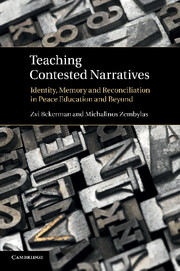Book contents
- Frontmatter
- Contents
- Acknowledgments
- Permissions
- Part I Introduction and theoretical underpinnings
- Part II Living and teaching contested narratives
- Part III Mourning, forgiveness and reconciliation
- 8 The nationalization of mourning in troubled societies
- 9 The work of mourning in schools
- 10 Forgiveness as a possible path towards reconciliation
- Part IV Conclusions
- References
- Index
- References
8 - The nationalization of mourning in troubled societies
Published online by Cambridge University Press: 05 December 2011
- Frontmatter
- Contents
- Acknowledgments
- Permissions
- Part I Introduction and theoretical underpinnings
- Part II Living and teaching contested narratives
- Part III Mourning, forgiveness and reconciliation
- 8 The nationalization of mourning in troubled societies
- 9 The work of mourning in schools
- 10 Forgiveness as a possible path towards reconciliation
- Part IV Conclusions
- References
- Index
- References
Summary
In this chapter we deal with mourning and its nationalization in troubled societies. Why mourning, you may wonder? Because mourning, like memory in the second part of our book, can also be viewed as a major social practice in the modern nation state; that is, as something we do, as an action that plays an important role in the production of “collective identities.” Yet this chapter might surprise the reader somewhat for it does not deal specifically with educational settings. We move for a moment outside the immediate educational sphere. We do so because we want to underline again an important point in our work which is emphasizing that education may be innocent of the creation of and/or solutions to conflict, yet it readily reflects hegemonic discourses and practices of “outside” environments. By going outside the immediate educational sphere, we show how hegemonic discourses of mourning (this chapter) work to have an impact on educational matters (Chapter 9). What we want to emphasize is that although we do not believe education can be made responsible for offering solutions to intractable conflicts, it can help – at times, when critically approached – create spaces where some oppositional work can be done. It may be difficult to do this oppositional work, and to do it in the public sphere; yet, it is important in showing that there are alternative options to hegemonic discourses and practices.
We argue, therefore, that, just like memory, mourning also constitutes a crucial site of disrupting the power of the nation state and contesting power relations as we know them. It is for this reason that some scholars in philosophy, political science and cultural studies speak of a politics of mourning. Essentially, this notion refers to the ways that politics and mourning are made to intersect (e.g., Butler, 2004; Kaplan, 2005) and personal stories blend with collective ones, with important political and educational implications. We want to examine, therefore, how public pedagogies of mourning also constitute certain school pedagogies.
- Type
- Chapter
- Information
- Teaching Contested NarrativesIdentity, Memory and Reconciliation in Peace Education and Beyond, pp. 135 - 147Publisher: Cambridge University PressPrint publication year: 2011

